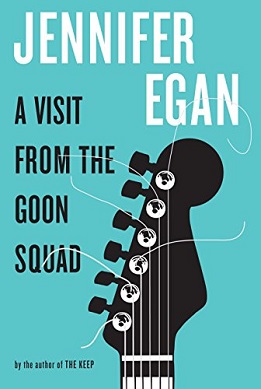Driving to pick up his son, Bennie alternated between the Sleepers and the Dead Kennedys, San Francisco bands he'd grown up with. He listened for muddiness, the sense of actual musicians playing actual instruments in an actual room. Nowadays that quality (if it existed at all) was usually an effect of analogue signaling rather than bona fide tape--everything was an effect in the bloodless constructions Bennie and his peers were churning out. He worked tirelessly, feverishly, to get things right, stay on top, make songs that people would love and buy and download as ring tones (and steal, of course)--above all, to satisfy the multinational crude-oil extractors he'd sold his label to five yars ago. But Bennie knew that what he was bringing into the world was shit. Too clear, too clean. The problem was digitization, which sucked the life out of everything that got smeared through its microscopic mesh. Film, photography, music: dead. An aesthetic holocaust! Bennie knew better than to say this stuff aloud.
Writing about music in fiction is almost impossible. People usually fail at it. Carson McCullers could do it, but her milieu was classical music, and she was smart enough to eschew describing the music itself in favor of the feeling of it, the complicated torture and ecstasy of it. Writing about popular music is often dead on the page. It sounds like nothing, is reduced to a series of cultural signifiers that encode their own transitory nature. Jennifer Egan, in A Visit from the Goon Squad tackles this problem head-on, not only minimizing the descriptions of the music itself to a few quality moments, but also by setting her sights on that transitory quality. The Goon Squad of the title is time, which busts in on life, wrecks your body, drives you into the suburbs, kills your friends, and worst of all, replaces the music you loved with shit you don't understand--and turns your music into classic rock.
Egan chases these themes over a series of loosely related vignettes. She begins with Sasha, a high-level operative at a record label who battles kleptomania, and Bennie, an ex-punk who owns the label. These are the main characters, such as they are, though the narrative spins backwards and forwards through several generations. Some of these vignettes are more successful than others. I thought the middle section of the book, while full of plenty of good ideas--like the disgraced publicist who ends up working, out of desperation, with a brutal dictator--slipped too far from the musical heart of the novel. It's not until the narrative returns to Bennie and Sasha and pushes past the past and present into the future that the novel really felt of a piece to me. Along the way, there are several inspired moments and images, like the flakes of gold that Bennie takes for his impotence, or the fish that his down-and-out old bandmate Scott fishes out of the East River, to present like a gift from another world in Bennie's penthouse office.
My favorite chapter, actually, was the one that might seem most gimmicky: a vignette presented in the form of a Powerpoint presentation. It's from the perspective of Sasha's teen daughter Alison, and it details the life of her family: her mother's past in the music scene, her father's life as a surgeon who works on refugees, her younger brother obsessed with pauses in popular music, life in the desert as a result of climate change. There's a lot going on in this story, but the silly mode actually works to pull everything together. The antiquated nature of Alison's slidemaking hobby (it's the 2020's) echoes her mother's nostalgia for her life in the music scene, and the nostalgia of a United States before the ravages of climate change and war. Several blank slides emphasize the peculiar nature of her brother's obsession. As Sasha explains, through clenched teeth to her husband, "The pause makes you think the song will end. And then the song isn't really over, so you're relieved. But then the song does actually end, because every song ends, obviously, and THAT. TIME. THE. END. IS. FOR. REAL." In this detail is the hope of rebirth and recovery, accompanied by the sobering knowledge that time--the goon squad--moves on inexorably.
The novel ends with a bit of sci-fi weirdness, set in a not-so-distant future in which babies use their preverbal ability to point and buy music from ephemeral screens to control pop culture. (That's a satirical comment on the way that pop culture drifted in the 19th century to teenagers, and preteens, I guess.) In that strange and somewhat awful future, beset by the twin monsters of payola and the police state, Egan manages to find a way to give the old hope of punk rock a purpose and a future.


No comments:
Post a Comment